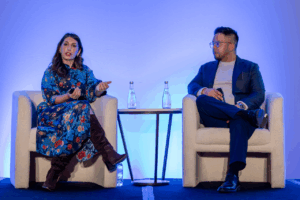 “Data-Driven Thinking” is a column written by members of the media community and containing fresh ideas on the digital revolution in media.
“Data-Driven Thinking” is a column written by members of the media community and containing fresh ideas on the digital revolution in media.
Joanna O’Connell is Principal Analyst at Forrester Research.
Is Facebook finally getting over itself?
Or, rather, is Facebook actually starting to realize that its place in the advertising ecosystem is just that – a place – not the whole answer, but rather a part of the answer?
If the recent news that Adometry will be allowed to place attribution tags inside the Facebook ecosystem is any indication, Facebook is starting to get the message.
I personally think this is a HUGE deal. Probably because I’ve been shouting about the absolutely critical need for multi-touch attribution for years and years (yep, well before joining Forrester, I promise), and continue my shouting from both the page and stage.
I suppose the cynical view is that Facebook is making these moves because, as a public company, shareholders demand results and today, given that 84% of Facebook’s revenue comes from advertising, they’d better learn to play nice with advertisers or risk lost revenue and angry shareholders. But I’d rather believe, optimistically (naively, many of you will say) that Facebook is finally starting to listen to the brands that spend millions of dollars with them every year: in a world increasingly populated by “Always Addressable Customers” (so named by Forrester, these are folks with 3 or more connected devices who access the internet multiple times a day from multiple physical locations – a whopping 38% of the US online adult population in 2011) who clearly do NOT think in channels or devices, there’s NO WAY for a marketer to deliver the right experience to those consumers if she’s dealing with a bunch of walled garden environments that don’t talk to each other.
Of course, this recent move by Facebook only takes us part of the way: evidently Adometry’s tags will only be allowed on paid media – seriously limiting the depth of information its system can glean in an environment rich with earned and “owned” assets – not to mention that API-based, and other programmatic buyers, are out of luck for now. But it’s a start. And revolutions have to start somewhere. With one guy shouting for change, or one stubborn social media behemoth accepting advanced attribution tags from an upstart vendor. It’s a start.
So buyers, here’s my advice for you –
Stop and think about how you behave, what you expect from the brands with whom you interact. You’re starting to expect that they know you, that they’re going to tailor their experiences based on what you want or need. And you’re annoyed when they let you down – by treating you like a stranger, or serving you messages that are, at best, irrelevant, at worst, insulting to you. It’s not ok, is it? If consumers don’t think it’s ok, we as marketers BETTER not think it’s ok either, or we’ll lose the game in the long run.
Help fuel the revolution: demand that organizations like Facebook be part of the solution that moves us to an audience-centric, channel-agnostic marketing ecosystem, rather than the crappy, no-better-than-a-guess one we’re still mired in.
It’s your money. There’s no rule that says how you have to spend it.
Follow Joanna O’Connell (@joannaoconnell), Forrester Research (@forrester) and AdExchanger (@adexchanger) on Twitter.












